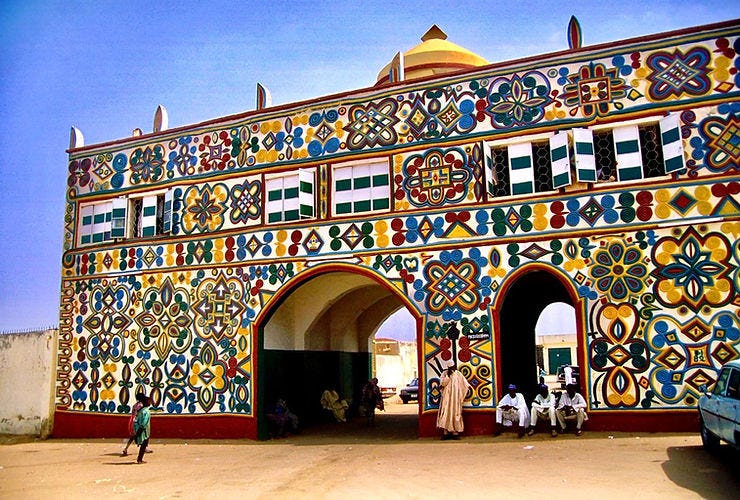Reading List
A Few Favorites from Around the Internet
When I am in Athens, I feel my brain come back to me a bit. I blame. the city. It’s a much less internet-hobbled place. There are no video advertisements on the streets. No screens to force-feed you vapid factoids about the city. People go to protests to protest, and concerts to listen, without need of a glowing surveillance device slash psychological hole filler to prove that they were there. My Greek friends would mock me for writing this, but Athens feels saner, and this influences me. I want beautifully crafted words, not a thin gruel of cat videos and outrage with which to scroll away three hours. Here are some pieces I’ve liked
Bayt Al Fayn on the traditional Hausa architecture of Northern Nigeria.
As a counterpoint- “Why is Everything so Ugly”. N+1
WE LIVE IN UNDENIABLY UGLY TIMES. Architecture, industrial design, cinematography, probiotic soda branding — many of the defining features of the visual field aren’t sending their best. Despite more advanced manufacturing and design technologies than have existed in human history, our built environment tends overwhelmingly toward the insubstantial, the flat, and the gray, punctuated here and there by the occasional childish squiggle. This drab sublime unites flat-pack furniture and home electronics, municipal infrastructure and commercial graphic design: an ocean of stuff so homogenous and underthought that the world it has inundated can feel like a digital rendering — of a slightly duller, worse world.
My favorite Substack discovery is John Ganz’s Unpopular Front, and his latest piece on police shows why
Like everything else, police brutality is a political and economic problem. The sullen and often murderous group solipsism of cops is not the result of ethereal causes, but because they have become an alienated and alienating force in our society. The cops are a group apart from the rest of the country, with their own neighborhoods, own towns, own bars, and even their own flag now. The mafia calls itself la cosa nostra, this thing of ours, and the cops, too, have a thing of theirs. The dark triad of brutality, racism, and corruption, which so often appear together, stems from this essential apartness: they all reflect a self-conscious apprehension of superiority, difference, and conspiracy against the outside world. This is all exacerbated by the post-industrial ruin of our cities: being a cop is one of the only rackets going, a way into the middle class, but the job is essentially keeping in line the left-behind and racialized poor of globalization.
“Sanctuary of Pure Expression” on the new biography of Mina Loy. NYRB
To her homeless neighbors, whom she often paid to run her errands, she was known as the Duchess. Her student housemates, who loved to listen to her stories, knew that she had once lived in Paris and achieved renown as a poet and artist, that she had been married to a man she called “a beautiful poet and the amateur boxing champion of France” until he disappeared (was he murdered, or did he run away?), that the few visitors invited up to her quarters had familiar names: Djuna Barnes, James Laughlin, Marcel Duchamp. Was this woman who lived among rags and egg crates and spent her days staring at the pigeons outside the window utterly mad, or was she a genius?
“The End of the Silicon Valley Myth: The companies that define our digital lives have hit a wall.” by Bryan Merchant
The tech giants that have shaped our lives, online and off, over the course of the 21st century have at last hit a wall. Amazon, Alphabet, Microsoft, Meta, and Apple all saw their valuations fall, sometimes precipitously. Many slashed their workforces; at least 120,000 tech workers lost their jobs this year. The myth of the genius founder, which insulated so many of these giants from so much criticism for so long, was debunked before our eyes.




Maybe the peak of social media is past us too